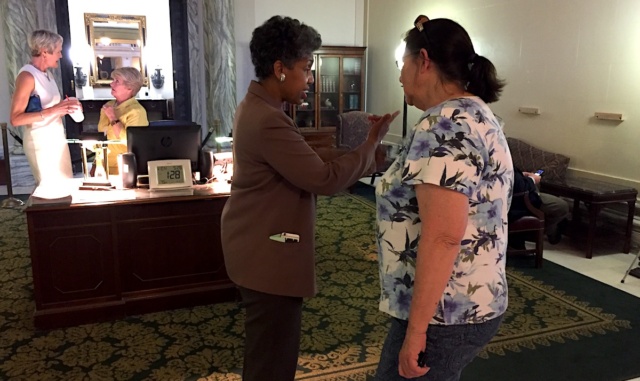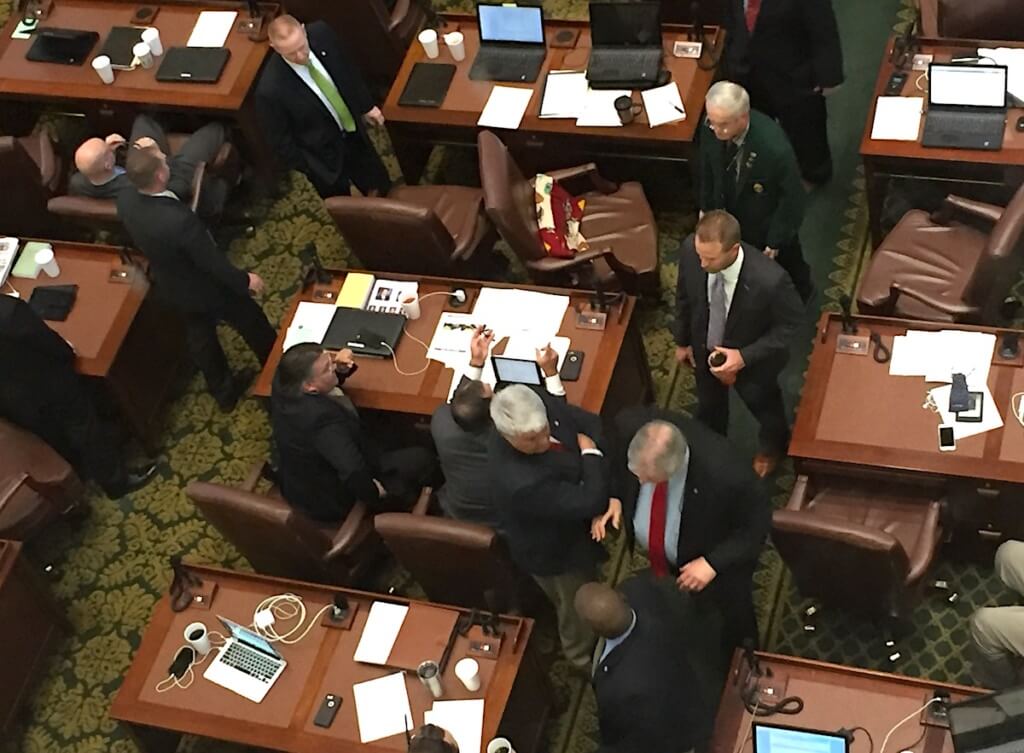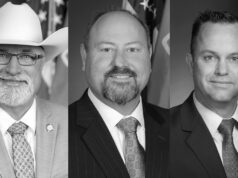
On the last day of the 2017 Oklahoma legislative session, when the fate of remaining bills was barely in doubt, a minor disruption in the House chamber quite possibly resulted in an important and unexpected lesson.
At least for me.
Rep. Regina Goodwin (D-Tulsa) questioned House Appropriations and Budget chairwoman Leslie Osborn (R-Tuttle) on the state’s appropriation bill. As had occurred several times throughout session, at least one unidentified Republican lawmaker taunted the body’s only black woman for asking questions that occasionally didn’t find a question mark as quickly as some members would like.
“Debate,” a member had said Friday, implying Goodwin was debating during the Q&A period, a violation of procedural rules.
The exchange happened first and then again, with Goodwin asking outgoing Rep. Scott Martin (R-Norman) for help identifying who had interrupted her from across the room. The second time, some Democrats took exception and walked over to that side of the floor. Multiple lawmakers said no one would own up to having made the remark.

From the press gallery, journalists leaned close to the glass, gawked at the bumping of a belly or two and speculated about what had been said. Cooler heads prevailed, despite the day’s stressful nature on the sleep-deprived.
Over the next hour, posts spread on social media, particularly from Democrats who criticized the situation as an example of racism and sexism.
That discussion grew, and it got me thinking about a lot of things — legislative decorum, Oklahoma’s low percentage of minority office holders, political theater, identity politics and the role of social media in modern democracy.
Twitter opens door to public misstep
That last element has fundamentally changed legislative bodies across the world. In debate today on the controversial and potentially unconstitutional Smoking Cessation Act of 2017, Osborn read a series of tweets between Rep. Jason Dunnington (D-OKC) and 2018 Democratic gubernatorial candidate Drew Edmondson. It was not the first time social media had been read aloud for members this year, and many members live-tweet (or post on Facebook) from the floor.
I had taken to live-tweeting the final week of this session. With it came a great number of new followers, some admiration of my lighthearted but fact-focused approach, and some criticism from one Republican senator and one Democratic representative who felt mischaracterized by a single tweet each.
But Friday, I made what I had hoped all week to avoid: a tangible mistake that would draw ire from offended parties.
This won’t be popular, but if sexism & racism caused men to interrupt Rep. Goodwin, what made her interrupt Gov. Fallin on May 16? #okleg
— Tres Savage (@thricesavage) May 26, 2017
My mistake came three-fold:
- First, I should have used a different word than “interrupt” to describe Goodwin’s bold interjection of her comments to the GOP press conference. (Full video here.)
- Second, I should have avoided using Twitter’s character-limiting medium to pose my question so that I could elaborate on the fact I had only read and watched video of the event.
- Third, I should have realized the difference between the two events. Fortunately, plenty of people explained it to me, on the record, off the record and on Twitter.
One of those people was Bailey Perkins, an analyst for the Oklahoma Policy Institute who said she was commenting personally and not on behalf of her employer.
“She has been constantly disrespected throughout the entire legislative session,” Perkins said of Goodwin. “This was an opportunity where she was given the floor to ask her question and do the same thing her colleagues do on both sides of the aisle. But they are never disrespected. People don’t talk and yell out ‘Debate’ while they’re doing the same type of discussion within their questions.”
Perkins is black, and her observation made sense in a way so obvious in retrospect that it’s embarrassing to write of my ignorance.
Goodwin had engaged with Gov. Mary Fallin on a matter of policy and political rhetoric. The men who criticized her with whoops of “Debate!” were dismissing her opinions and thoughts on linguistic grounds that are mostly irrelevant and commonly employed by other white male legislators.
As a white male, I had focused on only the two scenarios’ overarching similarity — that they both occurred in the realm of political theater.
I had failed to consider the larger ramifications of that dismissive chiding. Off-the-record conversations with a half-dozen Republican representatives convinced me that many — not all — hadn’t considered those big-picture aspects, either.
Kerfuffle distracts from policy issues

I waited outside the House chamber while lawmakers finished their pomp and circumstance, smiling, laughing and waving to loved ones despite the knowledge that most everyone in the building was dissatisfied with the budget just sent to Fallin.
When Goodwin and I finally sat down to discuss her day, she was hesitant to speak about the situation with me for two reasons. First, she said any story involving her and race had the potential to paint an unflattering picture, much as she felt stories of her questions to Fallin had done.
Second, she had no idea about any of the social media discussions about the morning’s brief events. As I showed her social media posts — including my own — she said the Facebook and Twitter comments explained why she had been receiving text messages asking if she was OK.
“I’m thinking, ‘Am I OK?’ Yeah, I’m OK,” Goodwin said.
She feared something that I often fear — that social media characterizations of what happens inside the Oklahoma State Capitol would become misconstrued.
“That kind of story, when my name gets attached to it, they won’t care what I said about senior citizens,” Goodwin said. “They won’t care at all what we’re talking about when we’re talking about education. They won’t care at all that for the last two years I’ve been trying to get community policing in Tulsa, Oklahoma, and the police chief refuses to do so.
“Those won’t be topics. Somehow I’ll get pigeonholed into, ‘Regina Goodwin is the race baiter. Regina Goodwin tried to play the race card. Regina Goodwin’s always talking about race.’ When it never came out of my mouth. But you see, if that’s what someone wants me to become, that’s what it will become. Just from something like that.”
I certainly hadn’t wanted Goodwin to be portrayed negatively in the situation. After our conversation, it made sense why she would be hesitant to talk about race when she felt like journalists and social media socialites rarely want to talk about her policy efforts.
To that end, she told me about HB 1357 (embedded below). The bill creates the Oklahoma Caregivers Support Act, which directs the Oklahoma Department of Human Services to make sure resource information is available for caregivers across the state and across the socioeconomic spectrum. The act will take effect Nov. 1 after being signed by Fallin.
“It expands those services in communities that typically don’t get that information,” Goodwin said. “It’s funny because a representative from a very rural area came to me and said, ‘Regina, I want to work with you on that because we need those services in my district.’ That’s what people should be writing about.”
Perkins said Friday’s situation symbolizes the additional challenges that minority women face. She expressed disappointment that House leadership from neither party had chosen to speak up against the silencing of those women this session.
“I hope members of this body will think differently about how they treat Rep. Goodwin and other women of color who may serve in this legislative body,” Perkins said. “It is a different experience because, historically, there’s only been eight black women who have ever been elected to serve in this building since statehood. Owing to a lack of representation, that leads to a non-understanding of the experiences of black women in this body.”
Goodwin said the Capitol can be a tough environment in which to have productive conversations on race.
“America is challenged with issues of race,” she said. “Oklahoma is a part of America, and open and honest dialogue would be the first step toward addressing those kinds of issues.”
https://nondoc.com/wp-content/uploads/2017/05/HB1357-ENR.pdf” height=”450px”]




















